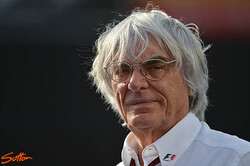


26/01/2014
NEWS STORY
 Bernie Ecclestone could use his £3bn fortune to settle bribery charges against him according to an article in the Mail on Sunday by Christian Sylt.
Bernie Ecclestone could use his £3bn fortune to settle bribery charges against him according to an article in the Mail on Sunday by Christian Sylt.
It is a surprising revelation because although settlements in court cases are common, it is rare to hear about criminal charges being dropped in return for an agreed payment. In Germany however, this is common and, crucially, completely legal.
Last week Munich's state court announced that Ecclestone will be put on trial in April for paying an alleged £27m bribe with his Bambino family trust to Gerhard Gribkowsky, a former executive at German bank BayernLB. Prosecutors believe that Gribkowsky was paid the money so that he would agree to sell BayernLB's 47.2% stake in F1 to the private equity firm CVC which had agreed to retain Ecclestone as the boss of F1.
Margarete Noetzel, spokeswoman for the Munich court, says that "according to German legal procedure, there is the possibility, during the trial, to stop the proceedings in return for payment of an agreed sum of money to a charitable institution or the treasury, if the accused, the public prosecutors and also the court agrees with it."
Ecclestone's lawyer Sven Thomas agrees and says that once the trial begins a settlement could put the brakes on it. "I don't think that we can achieve a settlement before the trial starts. During trials settlements are always possible but not before."
It can be a nice little earner for the courts. In June 2011 German engineering group Linde paid €35m to the Munich court to settle corruption allegations even though no unlawful activity was established. Four months later the court received €149m from industrial services provider Ferrostaal in settlement of bribery charges.
Gribkowsky was not so fortunate as his assets were frozen soon after he was arrested at the start of 2011 for receiving the money. The following year the Munich court sentenced him to eight and a half years in prison after he confessed that it was a bribe. Although he is currently serving the sentence it is understood that he is being let out of prison on a daily basis to work in the office of a local construction company.
Whilst it is fascinating that criminal trials can be settled in Germany through payment of money, there is absolutely no suggestion that Ecclestone or Thomas wants to go down this route. Quite the opposite in fact as Ecclestone has stressed he is innocent and vowed that he will fight the charges.
Thomas says he is "preparing for fighting. I think we have more than a good argument because Gribkowsky's so-called confession is not stringent and it doesn't fit with the facts." Ecclestone claims that Gribkowsky fabricated the confession in order to reduce his sentence.
He denies paying a bribe and claims that Gribkowsky threatened to tell the tax authorities that he controlled Bambino if the £27m was not paid.
Bambino is based offshore but Ecclestone is a UK resident so he would have to pay tax on the billions in the trust if he was found to be in control of it which he strongly denies. He says he paid Gribkowsky even though his threat was unfounded as it could have triggered a lengthy and costly investigation if it had been followed through.
Ecclestone concurs that a settlement could not prevent the trial from taking place and says that this is because Gribkowsky has already been convicted of receiving the alleged bribe. When asked whether he could pay to stop the trial taking place Ecclestone responded "the judge is in a difficult position. He has locked somebody up for eight and a half years. What he doesn't want to say is that he has abandoned this. He said if the prosecutors wanted to, he would give some consideration to doing that but the prosecutors haven't asked. The last thing he wants to do is say 'there wasn't a case' and somebody says to him 'that's very nice, you have locked the guy up for eight and a half years without even deciding.'"
If Ecclestone decided to negotiate a settlement during the case it could cost as much as £240m since this is the amount that BayernLB believes it lost through the sale to CVC. BayernLB was paid around £500m for its F1 stake but the bank claims that if the deal had not gone through other buyers would have come forward and paid more.
There is more at stake for Ecclestone than a prison sentence which could reportedly be up to ten years in length. Following the announcement about the trial he resigned from the board of F1's parent company Delta Topco although he will continue to run the sport on a day to day basis. As Pitpass has revealed this didn't affect Ecclestone's influence over the board but, nevertheless, he has insisted that he will get his directorship back once the trial is over. However, in November CVC co-founder Donald Mackenzie said "if it is proven that Mr Ecclestone has done anything that is criminally wrong, we would fire him." So if Ecclestone doesn't win, not only could he lose his freedom but his job as well.